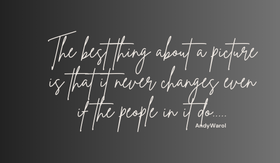
Frames of Influence: Exploring How Photographs Impact the Brain
Photographs have a significant impact on the brain due to the way our brains process visual information and the emotional connections we form with images. Here are some ways in which photographs affect the brain:
Visual Processing: The brain is highly attuned to visual stimuli. When we look at a photograph, our visual cortex processes the various elements such as colors, shapes, lines, and textures. This processing happens quickly and can evoke immediate emotional responses.
Emotional Engagement: Photographs have the power to evoke strong emotions and memories. When we see an image that is personally meaningful or relatable, it can trigger emotional responses, which can range from happiness and nostalgia to sadness or empathy. This emotional engagement is often driven by the content of the photograph and the viewer’s personal experiences.
Memory Enhancement: Photographs can enhance memory recall. When we see a photograph of a past event or experience, it can trigger memories associated with that moment. This is known as the “photo-taking effect,” where taking a photo of something can lead to better memory retention of the event.
Storytelling: Photographs can tell stories in a single frame. Our brains are wired to interpret visual cues, and a photograph can communicate complex narratives, ideas, or concepts without the need for words. This storytelling aspect engages different parts of the brain, making the experience more immersive.
Attention and Focus: Unique or striking photographs can capture our attention and hold our focus. The brain tends to be drawn to novel or visually appealing images, which can stimulate curiosity and exploration.
Mirror Neurons: When we look at photographs of people displaying certain emotions or actions, mirror neurons in our brain can be activated. These neurons help us empathize and understand the emotions and actions of others, leading to a feeling of connection with the subjects in the photographs.
Cultural and Personal Significance: Photographs can carry cultural, historical, and personal significance. When we see images of important events, places, or people, our brain’s response is influenced by the meaning we attribute to those images.
Mood Regulation: Looking at photographs that evoke positive emotions can positively affect our mood. This is particularly relevant in the age of social media, where people often share images that reflect happy moments in their lives.
In essence, photographs impact the brain due to the brain’s inherent visual processing capabilities, emotional responses, memory associations, and the ability of images to convey complex information and stories. The impact can vary based on individual experiences, personal connections, and the content of the photographs themselves.
Photo by Milad Fakurian on Unsplash
Contact
16a Croham Mount, CR2 0BR
07986297981 / hello@arc-portraits.com
Newsletter


